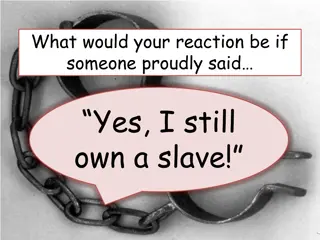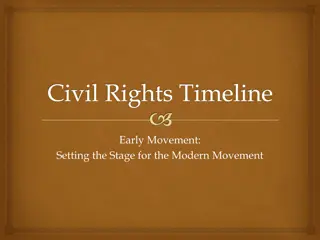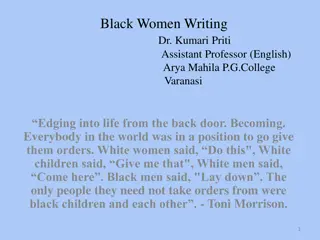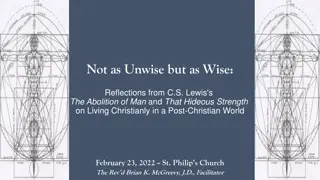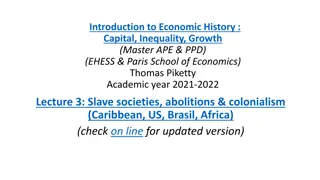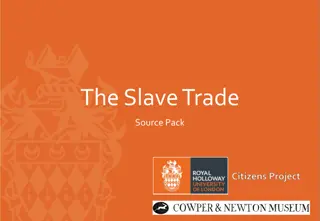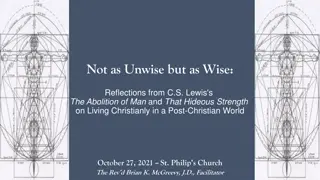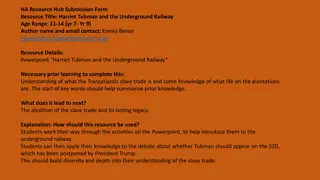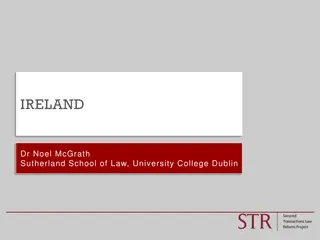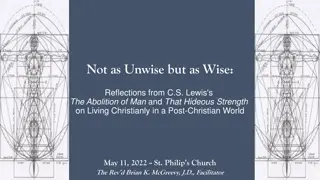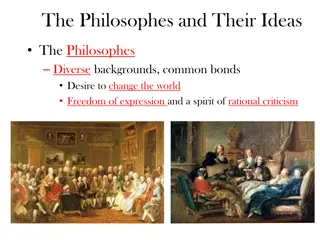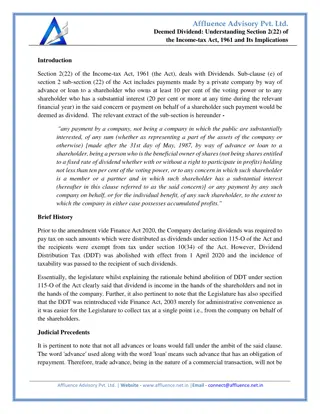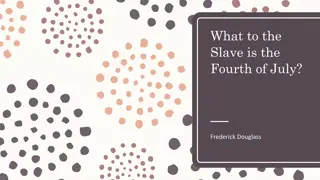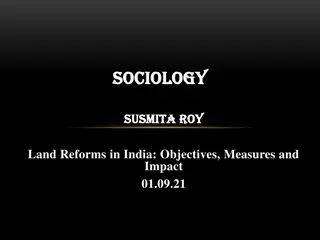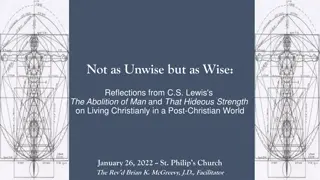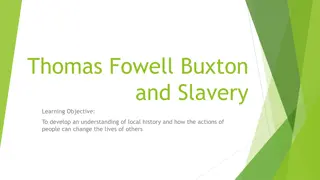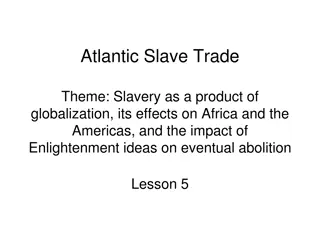Understanding Free Movement of Goods in the European Single Market
The European Single Market ensures the free movement of goods among its member states, prohibiting customs duties and equivalent taxes. The establishment of a customs union and harmonization of regulations play crucial roles. Despite the abolition of customs duties by 1968, further objectives like e
3 views • 16 slides
Understanding Socialism: A Comprehensive Overview
Socialism is a political and economic ideology that advocates for collective or state ownership of production, distribution, and exchange. It emerged in the early 19th century as a response to industrial capitalism, aiming for a more egalitarian society that prioritizes collective well-being. Social
0 views • 9 slides
Jeremy Bentham and Utilitarianism: A Vision for Social Reform
Jeremy Bentham, a prominent philosopher of the 18th and 19th centuries, advocated for utilitarianism, which states that the greatest happiness of the greatest number should be the measure of right and wrong. He proposed the concept of the Panopticon as a new mode of obtaining power over individuals.
2 views • 13 slides
The Journey to Abolishing Slavery: Understanding William Wilberforce & the Movement
Discover the historical context of slavery, the pivotal role of William Wilberforce, and the reasons behind Britain's decision to abolish the slave trade in 1807. Explore key events, debates, and societal shifts that led to the abolition movement, shedding light on the complexities and motivations i
0 views • 9 slides
Key Stage 2 SATs Changes and Expectations 2018/19 Overview
Changes in Key Stage 2 SATs including the introduction of a new national curriculum framework, abolition of old national curriculum levels, and transition to scaled scores. Parents can expect their child’s test results to be reported in scaled scores, with 100 representing the national standard. T
1 views • 10 slides
Early Civil Rights Movement: Abolition, Legislation, and Freedom
Abolitionist groups form to fight against slavery in 1775, leading to the establishment of the Pennsylvania Society for Promoting the Abolition of Slavery. Legislation such as the Slave Trade Act of 1794 and the outlawing of slavery by different states played a crucial role in the early civil rights
0 views • 58 slides
Evolution of School Uniforms: A Comparison Across Countries
The emergence, history, and current status of school uniforms in Russia, America, the USSR, and Britain are explored. From the abolition of mandatory uniforms in Russian schools to the diverse rules for attire in American institutions, the evolution of school uniforms reflects societal norms and edu
0 views • 10 slides
Struggles of Black Women Against Racism and Oppression in America
The institutionalization of black slavery in America created a deep divide between whites and blacks. Racism ingrained in American history perpetuated the belief of black inferiority. Despite racial discrimination, black communities formed a strong identity post-abolition. Black women faced intense
0 views • 18 slides
Living Christianly in a Post-Christian World: Wise Reflections
Reflections inspired by C.S. Lewis's "The Abolition of Man" and "That Hideous Strength" for navigating the challenges of living out a Christian faith in a world that drifts from traditional values. Delve into key themes, plot summaries of the Ransom Trilogy, and methods to engage with the texts. Exp
0 views • 19 slides
Development of Milk Production in Europe Post-Quota Abolition
The presentation evaluates challenges and opportunities for the EU dairy sector following the abolition of milk quotas in Europe. It reviews policy developments, context, structure, and functioning of the dairy sector. With insights from official data sources and consultation with key industry playe
0 views • 14 slides
Evolution of Public Education in the United States
The evolution of public education in the United States dates back to 1647 when Massachusetts Bay Colony decreed elementary and Latin schools. From Thomas Jefferson's two-track system to the abolition of segregation in Brown v. Board of Education in 1954, the journey has been marked by milestones lik
0 views • 13 slides
Slave Societies, Abolitions, and Colonialism: Economic History Overview
Explore the impact of slavery, abolition movements, and colonialism on economic structures in societies such as Britain, France, the USA, Brazil, Africa, and the Caribbean. Delve into the nuances of slave societies, the abolition process, extreme inequality, colonial finances, and decolonization in
0 views • 43 slides
The Slave Trade Source Pack and Key Information
Explore the history of the slave trade, key terminology, primary sources, and influential figures like John Newton, William Wilberforce, Mary Prince, and Olaudah Equiano. Learn about the Triangular Trade, Middle Passage, and the impact of the Industrial Revolution. Discover how abolition was achieve
0 views • 34 slides
Life and Achievements of Dr. Aghalya - A Pioneer in Indian History
Dr. Aghalya, a distinguished scholar and educator, played a significant role in shaping Indian history. As a Head and Assistant Professor in the Department of History at Bon Secours College for Women in Thanjavur, his contributions were profound. He was instrumental in several key reforms and initia
0 views • 19 slides
Veganmodernism: The Future of Meat Abolition and Technological Disruption
Explore the vision of Veganmodernism for meat abolition, the shifting technology landscape, the current and future costs and impacts of animal products, and the projected peak in global meat production. Delve into a future where modern food products outshine animal-derived foods both in quality and
0 views • 26 slides
The Assisted Decision-Making (Capacity) Act 2015 in the Criminal Justice Context
The Assisted Decision-Making (Capacity) Act 2015 introduces key reforms such as the abolition of wards of court system for adults, a statutory functional test of capacity, new guiding principles, a three-tier framework for support, and tools for advance planning. It emphasizes functional assessment
0 views • 17 slides
Living Wisely in a Post-Christian World: Insights from C.S. Lewis
Dive into the profound teachings of C.S. Lewis as we explore reflections from "The Abolition of Man" and "That Hideous Strength." Discover the essence of living Christianly in a post-Christian era through meaningful discussions and practical applications rooted in wisdom and hope.
0 views • 19 slides
Harriet Tubman and the Underground Railroad Presentation
Explore Harriet Tubman's courageous efforts on the Underground Railroad through an interactive PowerPoint, fostering understanding of slavery, abolition, and Tubman's legacy. Engage students in discussions about Tubman's impact on U.S. history and her potential appearance on the $20 bill.
0 views • 11 slides
History of Child Welfare in East-Central Europe: Transformations and Challenges
Exploring the evolution of child welfare in East-Central Europe with a focus on the history of the SSR, this research delves into the abolition of foster care, restructuring of childcare institutions, healthcare for infants, and the complexities of state intervention in family matters during the mid
0 views • 7 slides
Reform Process in Ireland: Company Law Changes
Explore the reform process in Ireland regarding the Company Charge Register, registration system, certificates, priorities, and negative pledge clauses. Changes include the presumption of registrability for mortgages, criminal sanctions abolition, and modifications in registration procedures.
0 views • 7 slides
Living Christianly in a Post-Christian World: Reflections on C.S. Lewis's Works
Reflections on living out Christian values in a post-Christian world through the teachings found in C.S. Lewis's "The Abolition of Man" and "That Hideous Strength." Explore themes of light versus darkness, wisdom, and the importance of discerning the will of the Lord. Dive into the Ransom Trilogy an
0 views • 24 slides
Enlightenment Philosophes and Their Revolutionary Ideas
Enlightenment philosophes such as Montesquieu, Condorcet, Voltaire, John Locke, Diderot, and Cesare Beccaria came from diverse backgrounds but shared a common desire to change the world. They advocated for freedom of expression, rational criticism, religious tolerance, separation of powers, educatio
0 views • 16 slides
Deemed Dividend-Understanding Section 2(22) of the Income-tax Act, 1961
Section 2(22)(e) of the Income-tax Act addresses Deemed Dividend, covering advances or loans given by private companies to shareholders with substantial interest. After the abolition of Dividend Distribution Tax (DDT) in 2020, the tax liability shift
0 views • 3 slides
Frederick Douglass: What to the Slave is the Fourth of July?
Frederick Douglass delivers a poignant speech on the Fourth of July, exposing the hypocrisy of America celebrating freedom while denying it to slaves. He challenges the nation to confront the injustices of slavery and calls for true equality and justice. Despite the grim reality he presents, Douglas
0 views • 4 slides
Reconstruction Period after the Civil War: Plans and Challenges
The Reconstruction period after the Civil War in the United States saw various plans proposed by President Abraham Lincoln, Republicans in Congress, President Andrew Johnson, and Radical Republicans. These plans aimed to rebuild the country and bring the Southern states back into the Union, addressi
0 views • 7 slides
Land Reforms in India: Objectives, Measures, and Impact
Land reform in India refers to institutional measures aimed at changing the ownership, tenancy, and management of land to improve agro-economic institutions. The objectives include achieving an egalitarian agrarian structure, eliminating exploitation, improving conditions for rural poor, and increas
0 views • 16 slides
The Radical Phase of the French Revolution: Abolishing the Monarchy
The French Revolution entered its Radical Phase in 1793, marked by violent events such as the abolition of the monarchy, execution of King Louis XVI, establishment of the French Republic, and the subsequent Reign of Terror. Tensions rose as war broke out with various countries, leading to internal c
0 views • 19 slides
The Radical Phase of the French Revolution
Strong reactions in neighboring countries sparked the radical phase of the French Revolution, leading to the establishment of the First French Republic. The Jacobin party, sans-culottes, and Reign of Terror are significant events during this period, marked by the execution of Louis XVI and the pursu
0 views • 5 slides
Overview of Legal Philosophy and Civil Rights Amendments
Understanding various legal philosophies such as natural law, legal positivism, legal realism, legal process, and critical legal studies, this content delves into the historical context of civil rights amendments, including the 13th, 14th, and 15th Amendments. It discusses significant cases and prov
0 views • 194 slides
Proposed Changes in Rental Laws: The Renters Reform Bill
The Renters Reform Bill is a significant proposal by the government to overhaul private rental laws, promising changes in landlord and tenant rights, duties of local authorities, and court processes. The key highlight is the potential abolition of s21 notices and assured shorthold tenancies. Despite
0 views • 21 slides
Living Wisely in a Post-Christian World: Reflections on C.S. Lewis's Works
Reflections on living as a Christian in a post-Christian world through the analysis of C.S. Lewis's "The Abolition of Man" and "That Hideous Strength." Themes explored include the importance of objective values, the role of Natural Law, and the battle between Good and Evil as portrayed in Lewis's Ra
0 views • 18 slides
Thomas Fowell Buxton: A Local Hero's Impact on the Abolition of Slavery
Discover the inspiring story of Thomas Fowell Buxton, a key figure in the abolition of slavery in the British Empire. Explore his life, achievements, and lasting legacy through monuments like Belfield House and the Buxton Monument on Bincleaves Green in Weymouth.
0 views • 10 slides
The Atlantic Slave Trade: Impact and Abolition
Slavery in Africa, fueled by Bantu migrations, led to a system where slaves had no rights but were crucial for wealth and power. The Islamic and European slave trades further exploited Africans, with the latter expanding significantly with the arrival of Europeans in the Americas. Portuguese slave t
0 views • 50 slides
American Religious and Societal Changes in the 19th Century
During the 19th century in America, religious movements like Deism and Unitarianism challenged traditional beliefs, leading to reformations and awakenings. The Second Great Awakening spurred social reforms, while figures like Joseph Smith and Horace Mann influenced education and society. Issues like
0 views • 9 slides
Living Wisely in a Post-Christian World: Insights from C.S. Lewis
Reflect on the teachings of C.S. Lewis in "The Abolition of Man" and "That Hideous Strength" to navigate living as a Christian in today's secular society. Explore themes of light versus darkness, wisdom, and uncovering truth through guided discussions and weekly reflections.
0 views • 12 slides
Historical Events of the 18th Century
Explore significant historical events of the 18th century, including political upheavals, revolutionary movements, and societal changes. From the American Declaration of Independence to the abolition of the slave trade and the rise of Napoleon, witness the unfolding of momentous events that shaped t
0 views • 38 slides



